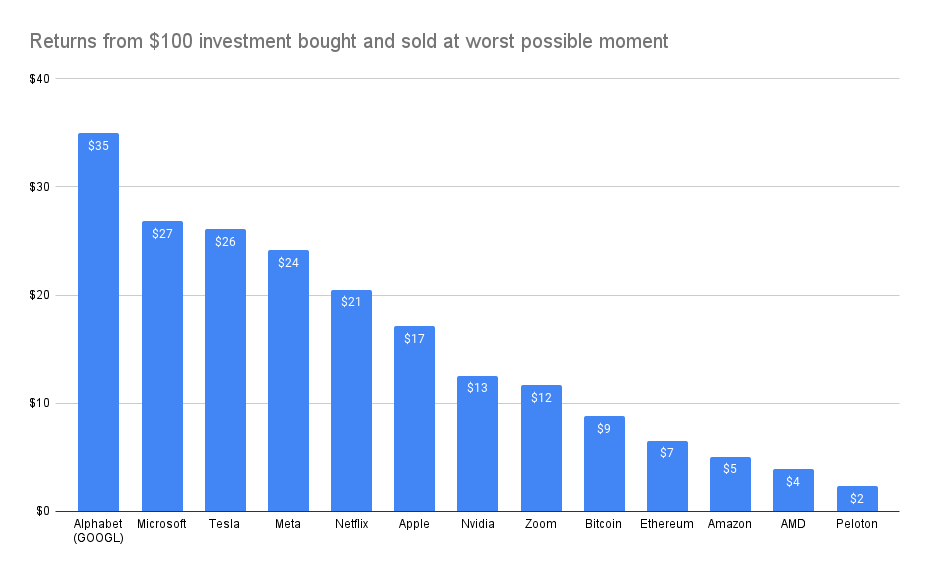
On the 10th January 2024, history was made when the SEC granted the first spot Bitcoin ETF in the USA. The SEC was reluctant to approve the ETFs because, if you take them for their word, they wish to protect investors from speculative assets and losing money. So their statement of approval contained words of caution: “bitcoin is primarily a speculative, volatile asset.” and “Investors should remain cautious about the myriad risks associated with bitcoin and products whose value is tied to crypto”.
In this post I want to focus on the SEC’s warning that Bitcoin, and crypto in general, is a high risk investment. In isolation, that statement may be true. But plenty of tradable assets, approved by the SEC, are also considered ‘risky’. I couldn’t find SEC statements warning against investing in specific assets besides Bitcoin. So the implication here is that Bitcoin is especially risky, to the extent that investors should be warned against it so they do not lose money.
As a fun and informative exercise, I made four comparisons to highlight the relative risk of crypto vs tech stocks:
1. The worst investments anyone could have made ever
1. The worst investments from the most recent market crash
1. The largest market cap loss
1. ROI loss per day, historically and recently
This is a long post and I want to point out that if you appreciate clear data and objective analysis you might want to check out [DefiDive.com](https://defidive.com). This is a crypto price, news and asset management terminal that I have built. For now, think of it like Coinmarketcap with less clutter and distractions.
**1. Worst Investment Possible: Crypto vs Tech Stocks**
Asset | Start Date | End Date | Start Price | End Price | $100 bought at top and sold at bottom was worth | ROI %
—|—|—-|—-|—-|—-|—-
| Alphabet (GOOGL) | Oct-2007 | Nov-2008 | $35.35 | $12.37 | $35 | -65% |
| Microsoft | Dec-1999 | Feb-2009 | $59.97 | $16.10 | $27 | -73% |
| Tesla | Nov-2021 | Dec-2022 | $414.50 | $108.24 | $26 | -74% |
| Meta | Aug-2021 | Oct-2022 | $382.76 | $92.60 | $24 | -76% |
| Netflix | May-2011 | Aug-2012 | $39.00 | $8.00 | $21 | -79% |
| Apple | Mar-2000 | Apr-2003 | $1.34 | $0.23 | $17 | -83% |
| Nvidia | Dec-2001 | Sep-2002 | $5.58 | $0.70 | $13 | -87% |
| Zoom | Nov-2020 | Oct-2023 | $505.88 | $58.87 | $12 | -88% |
| Bitcoin | Jun-2011 | Nov-2011 | $26.48 | $2.33 | $9 | -91% |
| Ethereum | Jan-2018 | Dec-2018 | $1,292.63 | $84.47 | $7 | -93% |
| Amazon | Apr-1999 | Sep-2001 | $5.53 | $0.28 | $5 | -95% |
| AMD | Jan-2006 | Sep-2015 | $42.01 | $1.65 | $4 | -96% |
| Peloton | Dec-2020 | Feb-2024 | $167.37 | $3.96 | $2 | -98% |
The worst investment possible in Bitcoin returned a -91% ROI and in Ethereum -93% ROI. In contrast, the ‘least worst’ investment is Alphabet with -65% ROI, the median investment is Nvidia with -87% ROI, and the worst investment possible is Peoloton with -98% ROI. Bitcoin and Ethereum have produced bad losses for anyone buying the top and selling the bottom, but other tech stocks (Amazon, AMD, Peloton) have delivered worse ROI for unlucky investors.
It is worth noting that the market cap of Bitcoin in 2011 was $173MM vs Google in 2007 was $231B. In other words, Bitcoin was worth 0.07% of Google. Comparing Bitcoin’s market crash vs publicly traded tech stocks puts Bitcoin at a disadvantage because these tech stocks only have tradable shares once the company has grown to be large enough to list on a stock market. For example, Google was founded six years before becoming a publicly traded stock in 2004. Bitcoin became publicly tradable within a year of creation and Ethereum was publicly tradable from the moment it was launched. Ultimately we are comparing Bitcoin at age two years old, Ethereum three years old, and Google nine years old. It is reasonable to expect higher volatility from newer and smaller assets.
**2. Worst Recent Investments: Crypto vs Tech Stocks**
Asset | Start Date | End Date | Start Price | End Price | $100 bought at top and sold at bottom was worth | ROI %
—|—|—-|—-|—-|—-|—-
| Apple | Dec-2021 | Dec-2022 | $182.13 | $125.87 | $69 | -31% |
| Microsoft | Dec-2021 | Oct-2022 | $344.30 | $219.13 | $64 | -36% |
| Alphabet (GOOG) | Oct-2021 | Dec-2022 | $149.12 | $86.37 | $58 | -42% |
| Amazon | Nov-2021 | Dec-2022 | $188.11 | $81.69 | $43 | -57% |
| Nvidia | Nov-2021 | Sep-2022 | $346.47 | $119.46 | $34 | -66% |
| AMD | Nov-2021 | Oct-2022 | $164.46 | $54.57 | $33 | -67% |
| Tesla | Nov-2021 | Dec-2022 | $414.50 | $108.24 | $26 | -74% |
| Bitcoin | Nov-2021 | Nov-2022 | $64,158.12 | $15,883.16 | $25 | -75% |
| Meta | Aug-2021 | Oct-2022 | $382.76 | $92.60 | $24 | -76% |
| Netflix | Oct-2021 | Jun-2022 | $690.97 | $164.28 | $24 | -76% |
| Ethereum | Nov-2021 | Jul-2022 | $4,733.36 | $1,036.19 | $22 | -78% |
| Zoom | Nov-2020 | Oct-2023 | $505.88 | $58.87 | $12 | -88% |
| Peloton | Dec-2020 | Feb-2024 | $167.37 | $3.96 | $2 | -98% |
Instead of using data from an asset’s entire history, this table compares the worst investments possible during the most recent market crash. All of the assets reached their respective bubble tops and market crashes at slightly different times, and Peloton might not have bottomed out yet. Bitcoin was the sixth worst asset and Ethereum was the third. This tells the same narrative that crypto investments can produce bad returns, but not necessarily much different from tech stocks.
**3. Market Cap Loss: Crypto vs Tech Stocks**
Asset | Start Date | End Date | Start Market Cap | End Market Cap | Value Destroyed
—|—|—-|—-|—-|—-|—-
| Peloton | Jan-2021 | Feb-2024 | $48,341,000,000 | $1,665,600,000 | -$46,675,400,000 |
| AMD | Nov-2021 | Oct-2022 | $195,524,200,000 | $90,305,100,000 | -$105,219,100,000 |
| Zoom | Oct-2020 | Feb-2024 | $161,647,800,000 | $18,910,800,000 | -$142,737,000,000 |
| Netflix | Jan-2022 | Nov-2022 | $729,473,500,000 | $313,861,300,000 | -$415,612,200,000 |
| Ethereum | Nov-2021 | Jul-2022 | $559,910,000,000 | $126,170,000,000 | -$433,740,000,000 |
| Nvidia | Nov-2021 | Oct-2022 | $835,067,500,000 | $279,552,300,000 | -$555,515,200,000 |
| Meta | Sep-2021 | Nov-2022 | $1,077,535,300,000 | $235,749,200,000 | -$841,786,100,000 |
| Tesla | Nov-2021 | Jan-2023 | $1,235,155,400,000 | $341,353,000,000 | -$893,802,400,000 |
| Bitcoin | Nov-2021 | Nov-2022 | $1,210,000,000,000 | $305,020,000,000 | -$904,980,000,000 |
| Alphabet (GOOG) | Nov-2021 | Nov-2022 | $1,997,397,915,765 | $1,076,770,529,999 | -$920,627,385,766 |
| Microsoft | Nov-2021 | Nov-2022 | $2,576,063,200,000 | $1,597,120,900,000 | -$978,942,300,000 |
| Apple | Jan-2022 | Jan-2023 | $2,986,128,300,000 | $1,989,628,300,000 | -$996,500,000,000 |
| Amazon | Jul-2021 | Dec-2022 | $1,875,751,400,000 | $847,145,400,000 | -$1,028,606,000,000 |
To avoid penalising assets just for being small, comparing the maximum market cap lost is another useful perspective. Amazon is the only asset to lose over $1 Trillion in value. Ethereum performs better than an average for the first time in this analysis. The ranking of this table suggests Bitcoin is comparable to Big Tech, while Ethereum is comparable to the large cap tech.
By none of the measures studied so far has Bitcoin or Ethereum performed the worst. Some might argue that perhaps the risk in crypto comes from the speed at which an investor might lose money. So the following analysis looks at ROI % loss per day during market crashes.
**4. ROI Loss per Day: Crypto vs Tech Stocks**
All-time worst market crash comparison:
Asset | Start Date | Crash Length (Days) | Average % change per Day
—|—|—-|—-|—-|—-|—-
| Microsoft | Dec-1999 | 3350 | -0.02% |
| AMD | Jan-2006 | 3530 | -0.03% |
| Apple | Mar-2000 | 1126 | -0.07% |
| Zoom | Nov-2020 | 1064 | -0.08% |
| Peloton | Dec-2020 | 1157 | -0.08% |
| Amazon | Apr-1999 | 884 | -0.11% |
| Alphabet (GOOGL) | Oct-2007 | 397 | -0.16% |
| Netflix | May-2011 | 458 | -0.17% |
| Meta | Aug-2021 | 426 | -0.18% |
| Tesla | Nov-2021 | 395 | -0.19% |
| Ethereum | Jan-2018 | 334 | -0.28% |
| Nvidia | Dec-2001 | 274 | -0.32% |
| Bitcoin | Jun-2011 | 153 | -0.60% |
Bitcoin lost -0.60% per day (average, non-compounding) during the 2011 crash. Which is almost twice as the next worst asset, Nvidia. However, we already established that Bitcoin was so small in 2011 that we aren’t making a fair comparison here. In the most recent market crash, Bitcoin’s ROI loss per day was -0.21%, which is similar to other tech stocks (see next table below)
Most recent market crash comparison:
Asset | Start Date | Crash Length (Days) | Average % change per Day
—|—|—-|—-|—-|—-|—-
| Zoom | Nov-2020 | 1064 | -0.08% |
| Peloton | Dec-2020 | 1157 | -0.08% |
| Apple | Dec-2021 | 365 | -0.08% |
| Alphabet (GOOG) | Oct-2021 | 426 | -0.10% |
| Microsoft | Dec-2021 | 304 | -0.12% |
| Amazon | Nov-2021 | 395 | -0.14% |
| Meta | Aug-2021 | 426 | -0.18% |
| Tesla | Nov-2021 | 395 | -0.19% |
| AMD | Nov-2021 | 334 | -0.20% |
| Bitcoin | Nov-2021 | 365 | -0.21% |
| Nvidia | Nov-2021 | 304 | -0.22% |
| Netflix | Oct-2021 | 243 | -0.31% |
| Ethereum | Nov-2021 | 242 | -0.32% |
In the most recent crash Ethereum lost -0.32% per day (average non-compounding). That is clearly the worst result here, but only one percentage point worse than Netflix. It is somewhat impressive that Zoom and Peloton have the lowest average ROI loss per day, but that is limited comfort to investors if the stock price never recovers. Objectively, with Ethereum already rebounding from $1.1K in Dec-22 to $3.9K in Mar-24, Ethereum has been a better investment than Peloton even if you did get rekt along the way.
**Conclusion**
Out of everything I have studied (not all of which made it into the final cut of this blog post), I find this graph the most useful for summarising potential losses when investing in crypto and tech stocks:
Looking back at the SEC’s statement, it does seem unfair to single Bitcoin out as a volatile asset when Bitcoin performed similarly to commonly traded tech stocks during the most recent market crash. It feels like the SEC statement is talking about Bitcoin’s volatility as if it is 2011. If we were to take the SEC’s statement as gospel, we would expect this analysis to show Bitcoin and Ethereum are significantly more risky than tech stocks. Instead Bitcoin performed similarly to other tech stocks during the recent market crash and Ethereum performed not much worse.
**A Sidenote on Beta**
Beta is a measure of an asset’s correlation to the broader market. This can be used as a proxy for measuring risk. Tech stocks have become so large that they effectively become ‘the broader market’. You can see below they all have betas close to one. In other words, if big tech share prices go up (or down), so does the S&P 500. Crypto has little correlation to the S&P 500, partly because it has outperformed it over the past 14 years. This gives crypto a beta close to 0, which effectively means anything or nothing could happen when the S&P 500 rises or falls. The beta for crypto has increased since 2020 but it is still far away from other tech stocks. In practice, this means that crypto could be considered as a method to diversify away from tech stocks / S&P 500. Ironically, you could make the argument that this helps lower the overall risk of a portfolio if someone invests sensibly into crypto to achieve more diversification.
Asset | Beta | Interpretation |
—|—|—-|—-|—-|—-|—-
| Ethereum | 0.08 | The asset’s price movements are independent of market movements. |
| Bitcoin | 0.20 | The asset’s price movements are independent of market movements. |
| Microsoft | 0.95 | If the market goes up or down by a certain percentage, the asset’s price is expected to move in the same direction by a similar percentage. |
| Alphabet (GOOGL) | 1.05 | If the market goes up or down by a certain percentage, the asset’s price is expected to move in the same direction by a similar percentage. |
| Apple | 1.06 | If the market goes up or down by a certain percentage, the asset’s price is expected to move in the same direction by a similar percentage. |
| Amazon | 1.12 | If the market goes up or down by a certain percentage, the asset’s price is expected to move in the same direction by a similar percentage. |
| Netflix | 1.15 | If the market goes up or down by a certain percentage, the asset’s price is expected to move in the same direction by a similar percentage. |
| Meta | 1.34 | If the market increases by a certain percentage, the asset’s price is expected to increase by a higher percentage, and vice versa. |
| Zoom | 1.36 | If the market increases by a certain percentage, the asset’s price is expected to increase by a higher percentage, and vice versa. |
| AMD | 1.48 | If the market increases by a certain percentage, the asset’s price is expected to increase by a higher percentage, and vice versa. |
| Nvidia | 1.78 | If the market increases by a certain percentage, the asset’s price is expected to increase by a higher percentage, and vice versa. |
| Tesla | 1.95 | If the market increases by a certain percentage, the asset’s price is expected to increase by a higher percentage, and vice versa. |
| Peloton | 2.84 | If the market increases by a certain percentage, the asset’s price is expected to increase by a higher percentage, and vice versa. |
Source: self.CryptoCurrency



